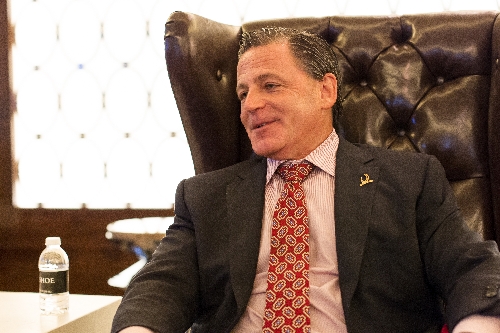Gilbert ‘rolled the dice’ for casino

CLEVELAND — Dan Gilbert resembled any other casino floor person.
Dressed in a dark tailored suit adorned with a Horseshoe name badge that had his first name in capital letters, Gilbert also wore a gold-colored Horseshoe lapel pin.
He blended in with many of the 1,600 Horseshoe Casino Cleveland employees Thursday afternoon who were about to take part in the property’s eight-hour controlled demonstration.
Ohio gaming regulators sealed up the $350 million facility to see if employees had been properly trained on internal control systems and could successfully operate a casino with 2,100 slot machines, 63 table games and a 30-table poker room.
Gilbert didn’t really need the name badge.
To Northeast Ohio residents, Gilbert – founder and chairman of online home lender Quicken Loans – is the Detroit businessman who saved the Cleveland Cavaliers.
He became majority owner of the NBA franchise in 2005. He renamed and renovated Quicken Loans Arena and helped revitalize downtown.
When the team’s franchise player, LeBron James, left as a free agent in 2010 for the Miami Heat during a made-for-ESPN hour-long television special, Gilbert penned an open letter to Cavalier fans that went viral. Gilbert vowed to win an NBA title without James, calling the basketball star "narcissistic," and saying that he deserted his hometown through a "cowardly betrayal."
Come Monday, Gilbert hopes his latest investment gives Cleveland a championship feeling.
The opening of the Horseshoe Casino Cleveland at 9:30 p.m. following a dedication ceremony, ribbon cutting, and a VIP celebration for the city’s elite will make Ohio the nation’s 23rd state with commercial casinos.
Gilbert’s company, Rock Gaming, is majority owner of the casino and the under-construction Horseshoe Casino Cincinnati. Caesars Entertainment Corp. owns 20 percent of the two casinos and has a contract to manage the properties.
"There is community pride and Cleveland pride in being the state’s first casino," Gilbert said in an interview in the Horseshoe’s VIP lounge. "Cleveland needs a great win. This city has hardworking, great people here. They’ve had the rug pulled out from under them so many times."
The Horseshoe is the kicking-off point for some $2 billion in visitor-related downtown Cleveland investment over the next five years. The casino could bring in 5 million annual visitors.
If Ohio’s overall gaming plans come to fruition – a full-scale casino in each of the state’s four largest cities and seven slot machine-only racetrack casinos – analysts believe Ohio could rival neighboring Pennsylvania’s gaming industry, which produced $3.02 billion in revenues in 2011 and is the No. 3 gambling market in the U.S.
None of this would have happened without Gilbert.
In 2009, he formed a statewide coalition of business leaders, elected officials and community representatives and set out to do what others had failed to accomplish – voter approval to legalize gaming in Ohio.
Casinos weren’t part of the conversation in 2005 when Gilbert bought the Cavaliers. But in 2006 and 2008, he watched Ohio voters reject statewide attempts to approve casinos, just as they had multiple times in the past two decades.
However, statewide polling always showed a majority of Ohio’s 11.5 million citizens actually wanted gaming.
"There was this huge disconnect between the polls, the research and the voting," Gilbert said. "We decided to do research and ask people what they wanted."
The issue that failed in 2006 was centered on Cleveland and only allowed slot machines.
In 2008, a move to put a casino in Dayton failed after Penn National Gaming, which operated casinos in neighboring states, dumped millions of dollars into a campaign to kill the measure.
Gilbert’s researchers found that voters would favor gaming in urban locations, with most of the 33 percent tax on revenues going to local governments, not the state’s general fund.
Ohio citizens also thought the number of casinos should be between four and six properties, not 15 to 20 as proposed in 2006, and not just one in Dayton.
Gilbert also facilitated a meeting with Penn National executives to get them involved in the four-casino plan. Rock Gaming took Cleveland and Cincinnati while Penn National received Toledo and Columbus.
"We put everyone together and sort of crafted out the proposal on a whiteboard," Gilbert said. "We took that to people to get their feedback."
In Cleveland, Gilbert used the goodwill built through success with the Cavaliers and in moving an American Hockey League franchise, the Lake Erie Monsters, into the arena. The casino, he said, wouldn’t compete with downtown restaurants and hotels, but would bring new business to the city.
"We sort of rolled the dice if you will, no pun intended," Gilbert said.
The measure passed statewide, 53 percent to 47 percent. Cleveland had the highest percentage of affirmative votes of any region in the state.
Now comes the next chapter.
The Horseshoe doesn’t have its own hotel rooms, and instead will funnel overnight guests to three downtown hotels.
The casino has a 400-seat buffet, but the food court features outlets by three popular Cleveland-area eateries.
Already, new restaurants and other businesses have sprung up around the casino in the historic Higbee’s Department Store building.
A second phase is planned for land next to the sports arena that could become a separate casino operated under the Horseshoe’s gaming license.
"I tell everyone we paid $85 million for the land, and not to watch weeds grow," Gilbert said.
With the Horseshoe four days from opening, Gilbert chuckled at being compared to historic Las Vegas casino figures – some who had nefarious connections – should Ohio fulfill its gaming potential.
"You better not do that while the Casino Control Commission is here," he said.
Surely, the regulators won’t take away his name badge.
Howard Stutz’s Inside Gaming column appears Sundays. He can be reached at hstutz@reviewjournal.com or 702-477-3871. He blogs at lvrj.com/blogs/stutz. Follow @howardstutz on Twitter.












